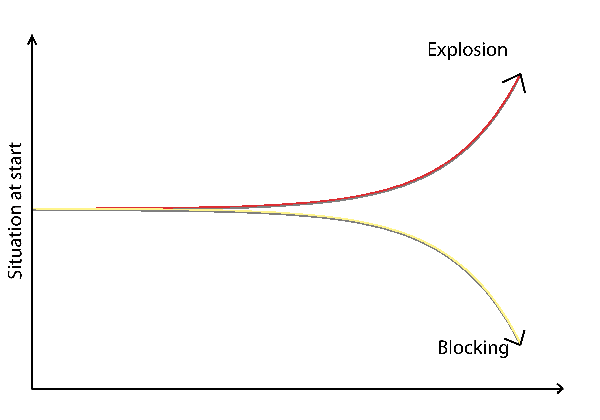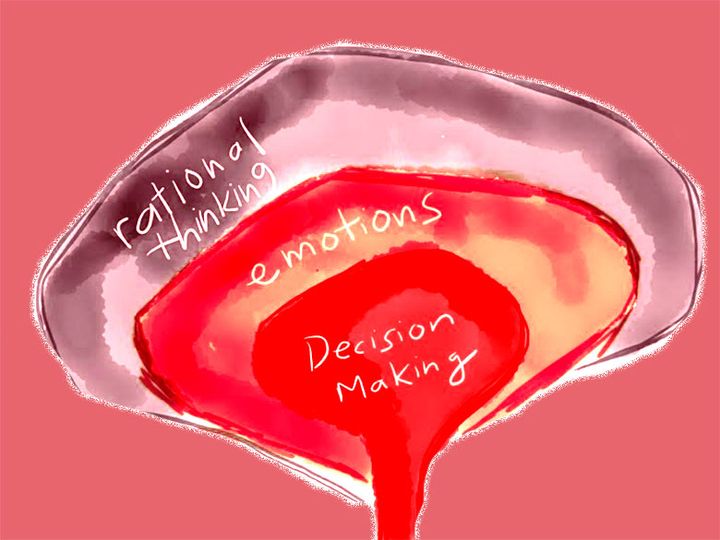
Texting in classrooms is a catastrophic development in education. But, this is not an article about teachers “cutting the leash”-- commandeering cell phones or encasing classrooms in Faraday cages. This is an article about the detrimental injustice of text-based education.
Whether you listen to Simon Sinek, Bruce Nappi, the Heath Brothers, or your local biology teacher, it is common to divide the brain’s structures into three parts, often referred to as human, mammal, and lizard.
The actual names of these regions, are the neocortex, limbic systems, and cerebellum.
In laymen terms, we're really talking about the physical control centers for logic, emotion, and instinct. There are variations within many of these “3-brain” models, but generally agree on one main theme: while we often ascribe our thoughts and behaviors to the "logical" area of the neocortex, in reality, the majority of our thoughts and behaviors are driven by logic's messier siblings: emotion and instinct -- only to be justified by (fuzzy) logic after the fact.
In the words of Simon Sinek:
“The neocortex is responsible for all of our rational and analytical thought and language. The middle two sections make up our limbic brains, and our limbic brains are responsible for all of our feelings, like trust and loyalty. It's also responsible for all human behavior, all decision-making, and it has no capacity for language.”
You read correctly. The lion's share of decisions and behaviors come from a place beyond language.
Logic and language exist, instead, as experts in damage control: attempting to maintain cohesion amidst the seemingly chaotic forces of emotion and instinct.
Should we remove logic and language from education?
Well, no, we shouldn't. This is not a case against logic.
The message is this:
Humans, as a general rule, are shaped by emotion and instincts. That being said, there are a number of people who intuitively learn to thrive upon the use of language and logic. However, these people are outliers-- the statistical minority. And perhaps more importantly, these outliers thrive upon the use of language and logic because of their emotional and instinctual conditioning which predisposed them to utilize language and logic to an advanced degree.
So what does this mean?

It means that our educational systems are designed by the minority: anomalous people who were fortunate enough to have an emotional foundation which provided incentive for the individual to excel inside of a verbal, text based system (academia).
This self-selecting propensity for text-based learners to rise to positions of power within a text-based system has created a compounding disparity brought about by a self-selection feedback-loop.
[Look at that sentence right there! That is the product of a mind emotionally and instinctually driven to utilize text, language, and “reason” which is not the mode of all human experience -- not by a longshot!]
And that’s the point. If you are reading this, and finding this text-based information interesting and engaging, you too are emotionally predisposed to text-based learning! Keep in mind, that fact alone doesn't make it the "norm."
It is far more common for people to have negative emotional and instinctual associations with reading, writing, mathematics, and other academic versions of “reason."

Unfortunately, the emotional aversion to text-based learning is nearly incomprehensible to most teachers, administrators, and most people in positions of power and influence (because, after all, most people in positions of power and influence, particularly in academia, are in those positions due to their own emotional predisposition to excel in a text-based education system.)
Thus, if you are a teacher who believes that “learning” (especially that of the verbal or text-based kind) is something that anyone can do with proper follow-through. However, if you as the teacher lack the awareness of your pre-cognitive emotional advantages that drove you to excel in school initially, you're going to hit some roadblocks. Even with 20 different textbooks, when students lacks the preconditioned emotional motivators to read, comprehend, and retain in that way, they simply won't. Instead, this moving target will simply breed frustrations (even resentment) and limited thinking for both the students and teachers. Worse yet, these conflicts will only serve to reinforce pre-existing negative bias against reading and learning.
No matter how "simple" a subject may seem, failure is almost guaranteed when content and method of delivery are emotionally and instinctually ineffective.
The world of education has often failed to realize that teachers are not simply the facilitators of an organic process in a world full of natural learners -- teachers are anomalies; attempting to communicate with people who, emotionally, are wired in a way which can diametrically oppose their foundational beliefs about information transfer.
[A better example might be this: Snakes scare most people. But, an anomalous group of people has positive emotions associated with snakes. This unusual disposition drives them to become snake collectors, reptile sympathizers, and even herpetologists. Allowing academics to create a universal education system makes as much sense as allowing herpetologists to design a petting zoo.]
Teaching Out of Text and Rewiring Emotions for Learning
The two primary problems are:
- An educational system designed by a minority in a way which only serves a minority and forces painful conformity on the remaining majority.
- Students who want to learn, but lack the awareness of their own emotional biases which counteract their learning objectives.
Accordingly, the solutions involve:
- Creating more experiential learning environments and subsequently attract a more diverse pool of educators.
- Provide democratic learning opportunities which allow students to learn in a way best suited for their learning style (and this means going beyond a paltry illusion of choice.)
- Empower parents and students with methods for discharging negative emotional biases and foster positive emotional associations with logic, reading, and other executive functions.
Recommended Reading for Disrupting Education
- Adel Diamond (executive function and learning through experience, see also: Tools of the Mind)
- The First 1000 Days (compounding disparity in cognitive function and social-economic status born from initial conditions)
- Self-Organized Learning
- Sir Ken Robinson
- Outliers--compounding disparity
- Mistakes Were Made (But Not by Me)
- Metacognition
- A3 Bruce Nappi
- Jane McGonigal
- The Biology of Desire (and how learning can be reinforced or avoided based upon the development of the same structures which enforce or prevent substance abuse)
- Deep Survival (and how the amygdala can drive behavior against logic or self-interest)
- Lynchpin








